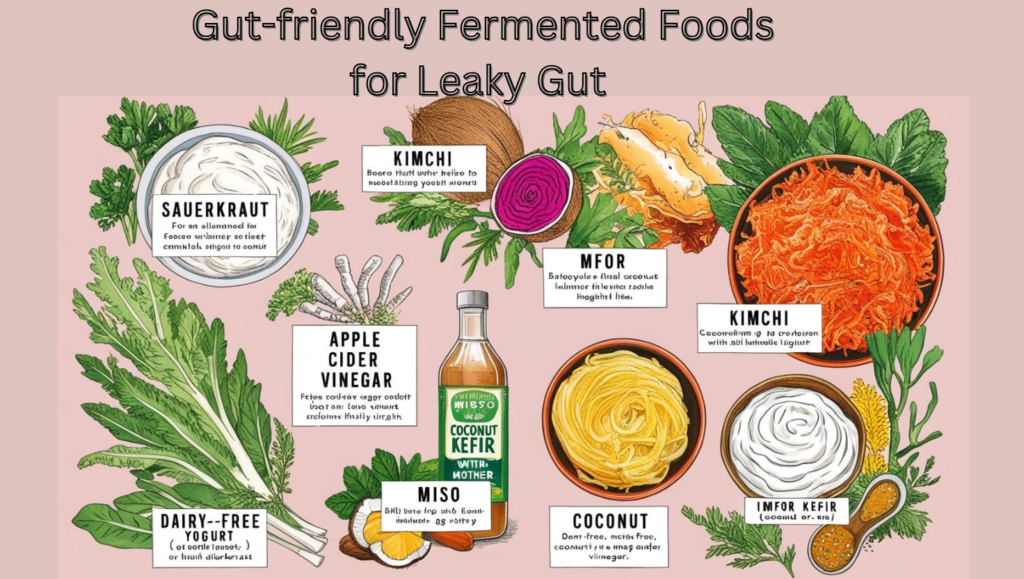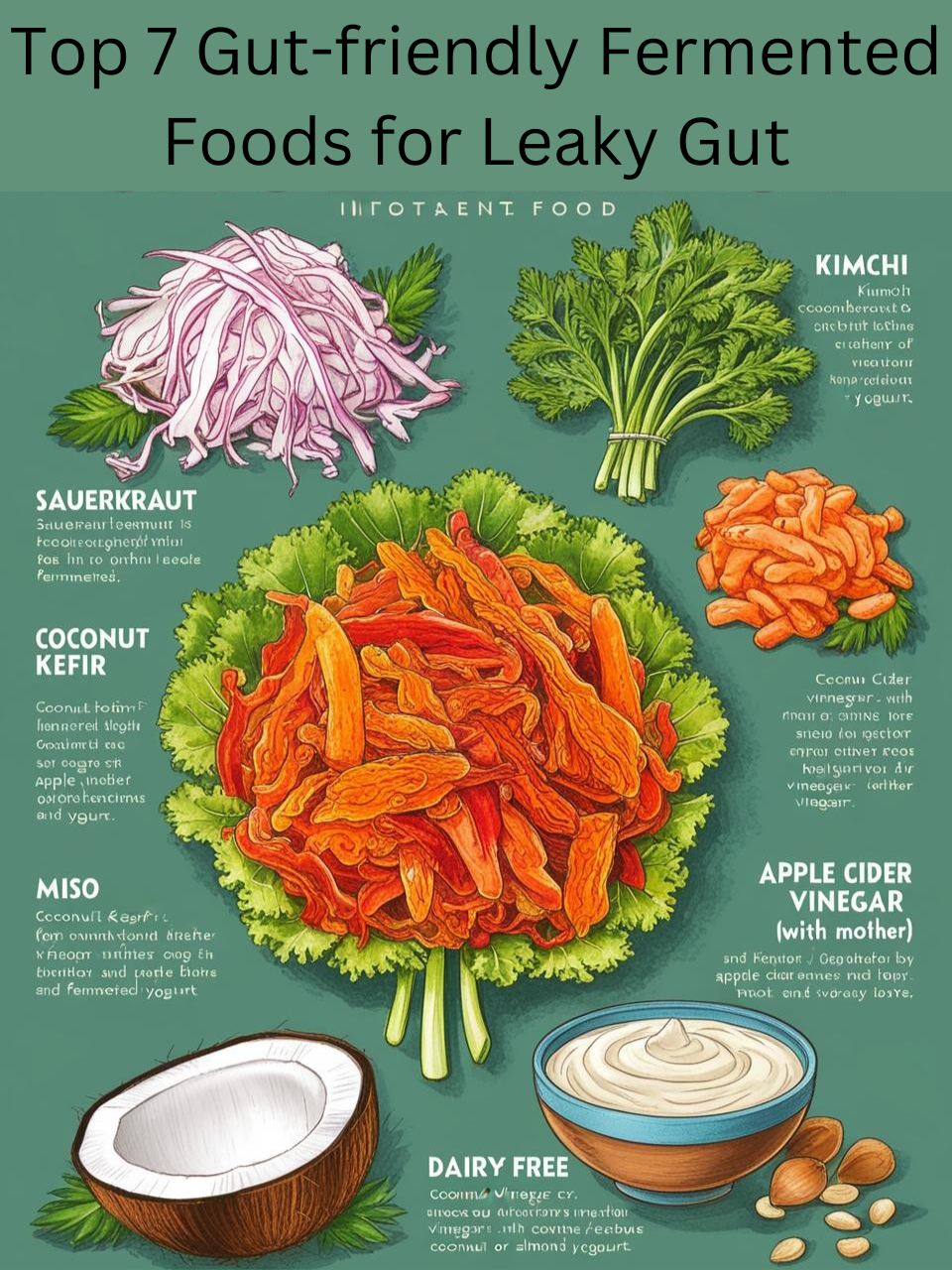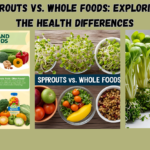
Understanding Leaky Gut Syndrome
Fermented Foods for Leaky Gut: Nourishing Your Gut Back to Health.
Leaky gut syndrome, or **intestinal hyperpermeability**, occurs when the lining of the small intestine becomes damaged, allowing undigested food particles, toxins, and bacteria to “leak” into the bloodstream. Normally, the gut lining acts as a selective barrier, absorbing nutrients while blocking harmful substances. However, chronic inflammation or damage weakens the tight junctions between intestinal cells, triggering immune responses and systemic inflammation.
processed food**Causes:** Factors like a high-sugar or processed-food diet, chronic stress, alcohol, antibiotics, and infections (e.g., Candida overgrowth) can erode the gut lining. Imbalances in gut bacteria (dysbiosis) and conditions like celiac disease also play a role.
**Symptoms:** Common signs include bloating, food sensitivities, fatigue, joint pain, skin issues (acne, eczema), and autoimmune flare-ups. Over time, it’s linked to conditions like IBS, Crohn’s disease, and even mood disorders due to the gut-brain connection.
**Mechanism:** When the gut barrier is compromised, the immune system reacts to foreign invaders, leading to inflammation. This cycle can perpetuate chronic health issues. Research also highlights the role of **zonulin**, a protein that regulates intestinal permeability, which may become overactive in a leaky gut
.DieEliminate inflammatory triggers (gluten, dairy, alcohol).To heal the gut, focus on fibre-rich whole fermented foods (kimchi, kefir , gut-friendly fermented food and affordable gut-healthy fermented food

Fermented Foods for Leaky Gut: Nourishing Your Gut Back to Health.
Why Fermented Foods?
Fermented foods are rich in probiotics (beneficial bacteria) and postbiotics (bioactive compounds like short-chain fatty acids). These elements work synergistically to:
Enhance Digestion: Enzymes in fermented foods break down nutrients, easing absorption and reducing gut irritation.
Restore Gut Flora Balance: Probiotics crowd out harmful bacteria and strengthen the gut barrier.
Produce Butyrate: A short-chain fatty acid that fuels intestinal cells, reduces inflammation, and tightens gut junctions.
Top Gut-friendly Fermented Foods for Leaky Gut
Prioritise. Not all fermented foods are equal. Prioritise these gut-healing options:
1. Sauerkraut (Unpasteurized)
- Why: Rich in lactobacilli strains and fiber. Opt for raw, unpasteurized varieties to retain live cultures.
- Tip: Start with 1–2 tbsp daily to avoid bloating.
- 2. Kimchi
- Why: Contains probiotics from fermentation and anti-inflammatory ingredients like ginger and garlic.
- Caution: Spicy versions may irritate sensitive guts; choose mild or homemade.
- 3. Coconut Kefir (Dairy-Free)
- Why: A lactose-free alternative to traditional kefir, packed with diverse probiotics.
- Tip: Use as a smoothie base or drink ½ cup daily.
- 4. Miso
- Why: Fermented soy or chickpea paste rich in enzymes and antioxidants.
- Use: Add to soups or dressings (avoid boiling to preserve probiotics).
- 5. Tempeh
- Why: Fermented soy with prebiotic fiber and complete protein. Easier to digest than tofu.
- Tip: Marinate and sauté for a gut-friendly protein source.
- 6. Apple Cider Vinegar (with Mother)
- Why: Supports stomach acid production and contains acetic acid for microbial balance.
- Use: Dilute 1 tsp in water before meals.
- 7. Dairy-Free Yogurt (Coconut or Almond)
- Why: Choose unsweetened, lab-tested brands with live cultures like L. acidophilus

How to Incorporate Fermented Foods for Leaky Gut: Nourishing Your Gut Back to Health
- Start Slow: Introduce 1–2 tsp/day to let your gut adjust.
- Pair with Prebiotics: Combine with fiber-rich foods (e.g., garlic, onions, asparagus) to feed probiotics.
- Diversify: Rotate fermented foods to expose your gut to multiple bacterial strains.
- Avoid Triggers: Skip high-sugar or store-bought options (e.g., sugary kombucha, pasteurised sauerkraut).
Science-Backed Benefits of Fermented Foods for Leaky Gut: Nourishing Your Gut Back to Health.
A 2021 Nutrient study found that fermented foods’ probiotics enhance gut barrier function by increasing tight junction proteins.
Butyrate from fermented foods has been shown to reduce intestinal inflammation in animal models (Frontiers in Immunology).
Precautions
- Histamine Intolerance: Some fermented foods (e.g., aged cheese, sauerkraut) may worsen symptoms in sensitive individuals.
- SIBO: Those with small intestinal bacterial overgrowth should consult a healthcare provider before adding probiotics.
- Quality Matters: Choose Gut-friendly fermented food that is organic, unpasteurised, and additive-free.
Sample Daily Meal Plan
- Breakfast: Smoothie with coconut kefir, spinach, banana, and chia seeds.
- Lunch: Tempeh stir-fry with quinoa and steamed asparagus.
- Snack: Carrot sticks with hummus (fermented with live cultures).
- Dinner: Miso soup with wild-caught salmon and kimchi.
- Dessert: Dairy-free yogurt with fresh berries.

Conclusion
Fermented foods are potent allies in healing leaky gut syndrome. Fermented Foods for Leaky Gut: Nourishing Your Gut Back to Health. Gut-friendly fermented foods offer probiotics, postbiotics, and enzymes to repair the intestinal lining. While they’re not a standalone cure, integrating them into a nutrient-dense, anti-inflammatory diet can accelerate recovery. Listen to your body, prioritise quality, and pair these foods with stress management and hydration for optimal results. While leaky gut is increasingly recognised, it remains controversial in mainstream medicine. Always consult a healthcare provider to rule out other conditions. Addressing root causes through diet and lifestyle often restores gut health, improving overall well-being.
Q&A: Fermented Foods for Leaky Gut Nourishing Your Gut Back to Health.
1. What is leaky gut, and how does it affect health?
Leaky gut (intestinal permeability) occurs when the intestinal lining becomes damaged, allowing toxins, bacteria, and undigested food particles to enter the bloodstream. This can trigger inflammation, digestive issues, food sensitivities, fatigue, and autoimmune conditions.
2. How do fermented foods support gut healing?
Fermented foods contain probiotics that restore beneficial gut bacteria, produce short-chain fatty acids (SCFAs) to nourish the gut lining, and enzymes that aid digestion. They also reduce inflammation and strengthen the gut barrier, promoting repair. Fermented Foods for Leaky Gut: Nourishing Your Gut Back to Health
3. Which fermented foods are best for leaky gut?
Opt for unpasteurized options like:
- Yogurt and kefir (dairy or non-dairy)
- Sauerkraut and kimchi (fermented cabbage)
- Miso and tempeh (fermented soy)
- Kombucha (fermented tea)
These provide live cultures and nutrients like vitamin K2 and zinc.
4. How much fermented food should I eat daily?
Start with small servings (1–2 tablespoons daily) to avoid bloating. Gradually increase to ½–1 cup daily, depending on tolerance. Consistency is key—aim for daily inclusion.
5. Are there risks to eating fermented foods?
Yes, for some:
- Histamine intolerance: Fermented foods may trigger headaches or rashes in sensitive individuals.
- High sodium: Sauerkraut/kimchi can be salty; rinse lightly if sodium-sensitive.
- Immunocompromised individuals: Avoid unpasteurized products due to rare infection risks.
6. What lifestyle changes complement fermented foods for gut health?
- Diet: Eat fiber-rich foods (vegetables, legumes) and avoid processed sugars.
- Stress management: Practice mindfulness/yoga to reduce cortisol.
- Sleep: Aim for 7–8 hours nightly.
- Hydration and exercise: Support digestion and microbiome diversity.
7. How long until I notice improvements?
Timing varies, but many report benefits like reduced bloating or better energy within 3–6 weeks. Full healing may take months, depending on gut damage severity.
8. Are fermented foods better than probiotic supplements?
Foods offer diverse microbes, enzymes, and nutrients, while supplements provide targeted strains. Combine both for optimal results, but prioritize whole foods for broader benefits.
9. What signs indicate my gut is healing?
Improved digestion (less gas/bloating), regular bowel movements, clearer skin, stabilized mood, and increased energy. Food sensitivities may also lessen.
10. Who should avoid fermented foods?
- Those with histamine intolerance or mast cell issues.
- People with SIBO (small intestinal bacterial overgrowth), as probiotics may worsen symptoms.
- Immunocompromised individuals (e.g., undergoing chemotherapy).
Final Tip: Always consult a healthcare provider before making dietary changes, especially if managing a chronic condition.
Fermented Foods for Leaky Gut: Nourishing Your Gut Back to Health



Pingback: 8 Master Powerful Healthy Habits for Optimal Weight Management - mysproutapp.com
Pingback: Revitalize with Green Detox: A Healthier You with Nature’s Superfoods - mysproutapp.com